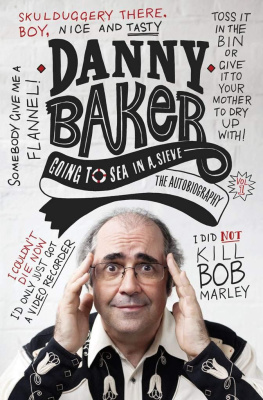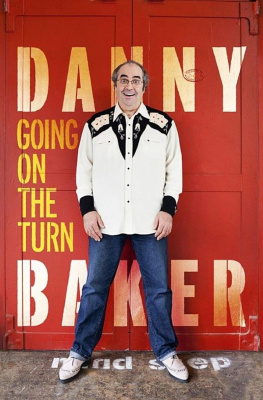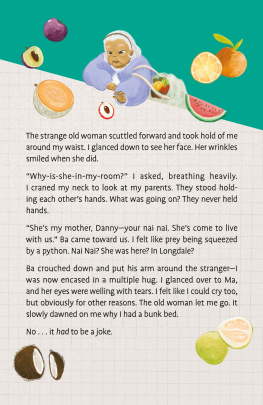Praise for Going to Sea in a Sieve
Joie de vivre , this Te. on spirit, is the engine that drives this memoir... Indeed, throughout this tome, Baker doesnt so much drop famous names as . re them at you with a cannon for seemingly no other reason than to amuse and entertain with top-notch anecdotes... This book is a hoot, buzzing with Bakers impressive recall and nuclear-strength warmth and humour. Going to Sea in a Sieve emerges not only as a portrait of Baker the individual, but also as a hymn to bygone times that is as affectionate as it is brutally unsentimental and hilarious. The perfect read for anyone interested in music, football, media, British cultural history, or indeed just having a really good laugh
Barbara Ellen, Observer
A beautifully written memoir
Independent
Like its author, Bakers book is garrulous, preening, self-mocking and funny. Its as rattling to read as it evidently was to write. In the proud Baker tradition, its a bit of a knockout
Stephen Smith, New Statesman
These memoirs, which cover his childhood and early career, burst with warmth and encounters with the famous, from Marc Bolan to Kate Bush
Belfast Telegraph
Baker writes as he speaks, with honesty and infectious joie de vivre
Sunday Express
Witty, sharp and hilarious
Metro
Reading Bakers memoirs feels a bit like. fying transatlantic with an irrepressibly garrulous stranger... the alacrity and invention of his mind is obvious
James McNair, Mojo
[A] rollicking first instalment of the life story of the broadcaster
Saga

To Teresa Guerrero Urbano and Ricard Simo.
And for my sister, Sharon.
In 1976 Steve Martin was making one of his first appearances on The Tonight Show with Johnny Carson. At some point during the interview Steve began to do a few typically bizarre impressions of showbiz greats. In response, Johnny Carson said he could do only one impression and that was of his second-grade high school teacher, a Miss Vance, and nobody ever wanted to hear that. The audience begged to differ. Carson tried to move on but the clamour from the crowd grew louder until he turned in mock amazement and said, You really want me to do my old high school teacher for you on national TV?
The audience made it clear they did.
Clearing his throat, Johnny Carson then spoke in the strangulated whine of an old maid: Now then, little Johnny Carson, you keep that up and its a spell in the old detention dumpster for you!
The place immediately exploded in wild applause and deafening cheers.
During this tumultuous din Steve Martin recalled that Carson leaned across to him and said in his ear, Sorry about that, but you stick around in show business long enough and eventually youll do everything you ever knew.
So. Here goes...
Contents
I am seven years old and the car in which I sit is, by now, totally enveloped in flames. The old banger had had a good run. Ever since we had found it abandoned on our dump in the 1960s, bombsites were called dumps we had been using it as a kind of base camp. Now, with its slashed front seats exposing clumps of horse-hair, together with the plywood tea chests we had squeezed into the rear after the seats were removed, it seemed to almost beg for a playful match. So we had all piled in, popped a Swan Vesta and declared whoever got out first was a coward and whoever stayed till last was the games winner. I know, I know. And kids these days make all that fuss about Nintendo.
On fire for about ten minutes now, it was clearly no longer a matter of when I should get out but whether I could get out. But I wasnt moving. Not yet. Not me.
The tea chest in which I squatted was starting to give off thin wisps of smoke that foretold, any second now, it would probably go up in a huge fireball. Still I was determined to win. Besides, other than me, there was only Peter King left inside this blazing wreck and Kingy was certainly no champion when it came to a rattling good game of chicken like this. He would definitely lose his nerve before long I mean, I had to believe that or what was the point of the whole exercise?
We looked at each other defiantly, head and shoulders poking up above the tin-lined edges of our tea chests, the flames now billowing along the roof of the rusted old vehicle, the smoke funnelling out through where once had been doors on the doomed Ford Popular. The thick plume billowed across the bombsite.
The front of the car had predictably gone up like a gasworks, disqualifying Tommy Hodges, Stephen Micalef and Tony Plumpton almost immediately as they panicked and leapt out, it seemed to me, prematurely. They hadnt lasted ten seconds. Now it was down to just Pete and me. And though I darent show it, yes, I was beginning to find the growing infernos repeated metallic bangs, pops and fizzes a tad alarming. Bit did he?
Of course what neither I nor Peter King, nor any of our half-dozen or so friends cheering us on from the relative safety of three feet away, had entertained for a moment was the idea that there might still be a petrol tank lurking within the old banger.
And it was growing fearsomely hot in there...
M um preferred the term maisonette but nobody else seemed to use the word. The truth is we mum, dad, sister, brother and me lived in a council flat: 11 Debnams Road, Rotherhithe, London, SE16. It was a completely fraudulent address, given that there were no numbers 110 in Debnams Road. There was barely a road. The turning, sitting around midway between Surrey Docks and the Old Kent Road in the borough of Bermondsey, was a hundred or so yards in length and comprised of nothing but an overgrown World War Two bombsite on one side and a monolithic mausoleum on the other. This was St Gertrudes Church just about the most featureless pile the Victorians ever consecrated.
Like Nol Cowards Norfolk, St Gertrudes was very flat; literally a dark solid brick wall with a door on it. You had to back away for several streets before you could see the cross on its roof and the building finally revealed its purpose. Otherwise you could be forgiven for thinking it was a workhouse or a prison. I dont think there can be another church like St Gertrudes; whatever glory is given to God by the design of St Pauls Cathedral, St Gertrudes certainly snatches it back again. In all the time I lived in Debnams Road and were talking about the first twenty years of my life I never saw a single wedding, funeral or exorcism team emerge from its portals. It was exactly the sort of functioning but forgotten outpost in a rough-house area that, in comedy films of the period, a hapless priest played by Norman Wisdom or Brian Rix would be assigned to in order to get rid of them.
Debnams Road itself came to a sudden end at the lopsided metal gates of a shapeless yard the council used for storing things they thought they might need later: mountains of empty paint tins, busted braziers, wooden pallets, concrete-encrusted wheelbarrows and various mysterious mounds covered by billowing tarpaulins. The whole ramshackle site was surrounded by a tall corrugated-iron fence as if anybody would ever want to pinch any of its worthless waste.
Looming above all these splendours was the railway.
Raised up on hundreds of blackened Victorian arches, the railway was Bermondsey. Every pub, every school, every block of flats seemed to sit in its shadow and you were never more than a few yards from its grinding shriek and the smell of sparking. The arches themselves housed the sort of nefarious businesses later reduced to clich by countless wide-boy TV crime series from Minder to Only Fools and Horses . There may have been some legitimate taxpaying concerns beavering away under the railway tracks, but most seemed busy repairing old motors while, simultaneously, right next door they would be breaking up identical models for yet-to-happen insurance claims.
Next page













